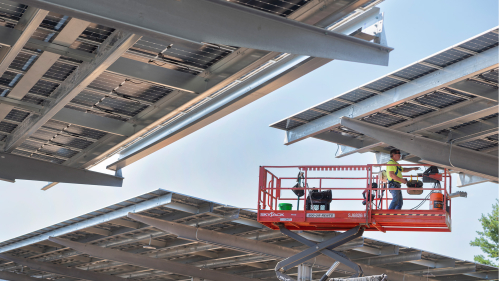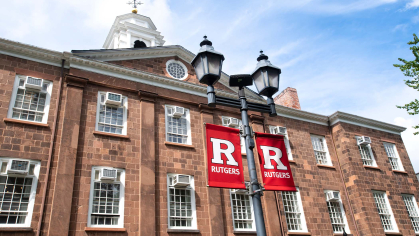Rutgers Launches Major Solar Panel Project to Promote Sustainability

Construction is underway on a project that will significantly increase the amount of solar power generated across the university and reduce energy costs in the first major sustainability initiative undertaken since President Jonathan Holloway announced Rutgers’ commitment to a Climate Action Plan.
The cost that Rutgers will pay for solar energy produced through the project is half the cost of power purchased from the utility company and is expected to save the university about $1 million annually, said Michael Kornitas, director of sustainability and energy with Rutgers Division of Institutional Planning and Operations (IP&O).
Under a Solar Development/Power Purchase Agreement (PPA), IP&O has licensed DSD Renewables to design, build, own, operate and maintain solar canopies on Rutgers parking lots across the campuses. DSD was awarded the project through a competitive bidding process.
Solar panels are being installed at 17 locations. Once complete, Rutgers will purchase the electric output generated from the solar panels at a rate less than purchasing it from the local utility company.
The panels will produce about 14.5 megawatts of power, and deliver an estimated 17,623,137-kilowatt hours, which is a little over 3 percent of the total energy consumed by the university.
Solar generation is expected to come online by December, Kornitas said.
The arrangement eliminates the need for Rutgers to expend its own funds while allowing it to benefit from the receipt of stable, low-cost electricity for 15 years. DSD, as the solar provider, benefits from tax credits and income generated from the sale of electricity along with the selling of SRECs through the Transition Incentive Program and the Successor Solar Incentive Program.
This project significantly adds to the existing inventory of solar canopies that currently cover 33 acres of the Livingston campus and generates about 8 megawatts of energy.
“It’s an unconventional project in that we are not spending university funds, but accruing significant benefits,” said Frank Wong, IP&O’s assistant vice president, University Planning and Development. “The project will significantly reduce our energy costs over time and be a visible sign of our ongoing sustainability efforts.”
“Under the power purchase agreement, we buy the electricity at a predetermined cost,” Kornitas said. Because there are no transportation costs associated with delivering solar power to the university, the KWH cost is greatly reduced.
The agreement clearly aligns with the recommendations and objectives of the Rutgers Climate Task Force and the work they are doing, said Antonio Calcado, executive vice president and chief operating officer.
“It is also an extraordinary first step in achieving our goal to have solar generation on all campuses. This project brings solid environmental and financial benefits to Rutgers,” Calcado said.


